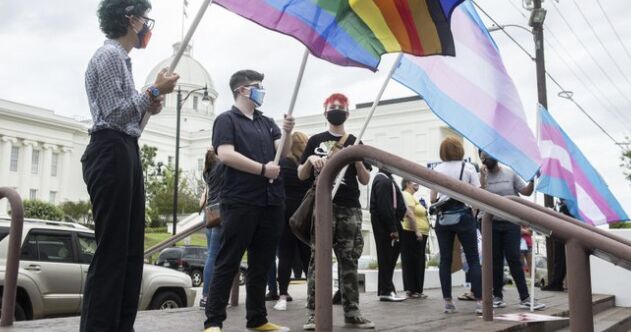Federal Appeals Court Upholds Alabama's Ban on Puberty Blockers and Hormones for Transgender Children, Leaving Families in Uncertainty
A federal appeals court has ruled in favor of Alabama's ban on puberty blockers and hormones for transgender children, marking a victory for gender-affirming care restrictions. However, the decision has left families of transgender children unsure about their medical treatment options. Medical experts and advocacy groups oppose the ban, stressing the importance of gender-affirming treatments. This ruling follows a string of similar decisions across the US, with many state bans currently being challenged in court. The battle over gender-affirming care for transgender minors continues, raising important questions about constitutional rights and the wellbeing of transgender youth.
In a landmark decision, a federal appeals court has ruled in favor of Alabama's ban on puberty blockers and hormones for transgender children. This ruling marks the second victory for gender-affirming care restrictions among Republican-led states.
The three-judge panel of the 11th U.S. Circuit Court of Appeals lifted a judge's temporary injunction against enforcing the law, allowing Alabama to move forward with its ban. Attorney General Steve Marshall praised the ruling as a "significant victory for our country, for children, and for common sense," emphasizing the state's role in safeguarding the wellbeing of minors.
However, the decision has left families of transgender children, who have been receiving treatment, in a state of uncertainty. The ban threatens doctors with prison time and limits access to essential medical care for transgender youth. Advocacy groups representing these families expressed devastation over the ruling and vowed to continue fighting for their rights.
Medical experts and major professional organizations, such as the American Medical Association and the American Academy of Pediatrics, oppose the bans, stating that gender-affirming treatments are safe and effective when administered properly.
Puberty blockers, a fully reversible prescription medication, pause sexual maturation, while hormone treatments can facilitate sexual development and changes in appearance. Dr. Morissa Ladinsky, a Birmingham pediatrician, expressed hope that the court's decision is only a temporary setback.
As someone who has treated numerous transgender adolescents, Ladinsky affirms the benefits of these treatments and their importance in supporting youth who need them. This ruling follows a series of recent decisions against similar bans in other states.
While at least 20 states have enacted laws restricting or banning gender-affirming care for minors, federal judges have temporarily blocked these bans in Florida, Indiana, and Kentucky. Notably, a federal judge in Arkansas struck down a similar law, and a federal appeals court has allowed Tennessee's ban to take effect.
Alabama's ban, known as the Vulnerable Child Compassion and Protection Act, was signed into law by Governor Kay Ivey in 2022. It is now a felony for doctors to provide puberty blockers or hormones to individuals under 19 to affirm their gender identity, punishable by up to 10 years in prison.
Four families with transgender children challenged the law, arguing that it violated equal protection and free speech rights, as well as intruded upon family medical decisions. The U.S. Department of Justice joined their lawsuit, seeking to overturn the law. While this ruling specifically applies to Alabama, many other state bans are currently being challenged in court.
More Republican-led states are also poised to enact similar bans, while Democratic governors in Louisiana and North Carolina have vetoed them but are expected to be overruled by Republican-led legislatures. The battle over gender-affirming care for transgender minors continues, with advocates and opponents clashing over medical decisions, constitutional rights, and the lifelong impact on transgender youth.




